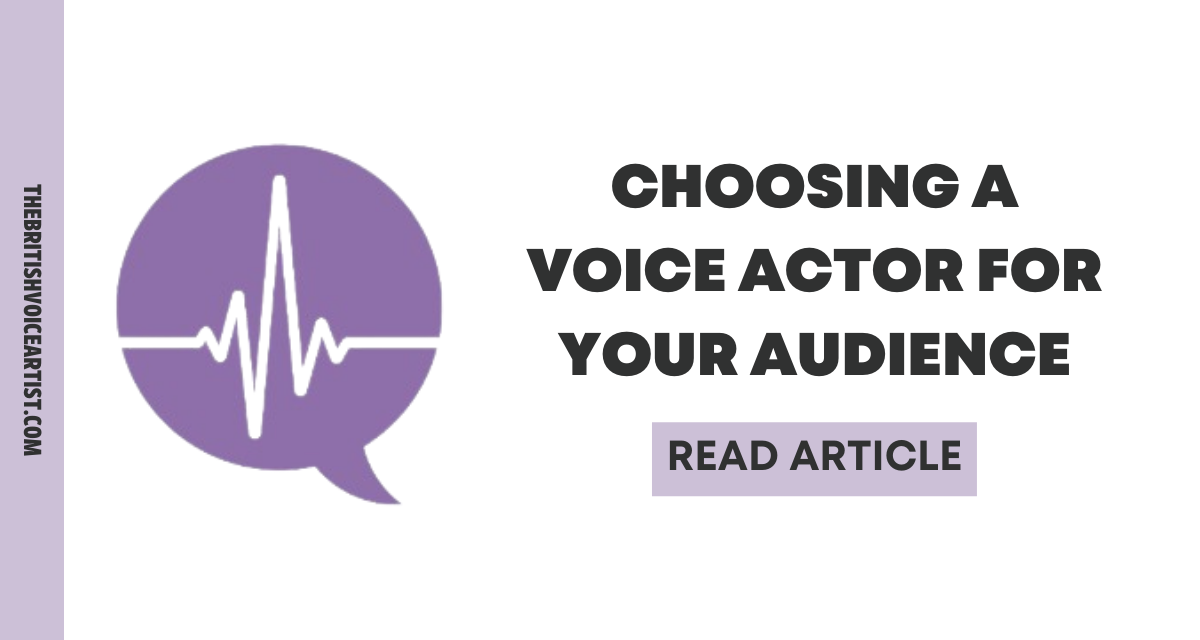Voice actors add more value to your project. Whether it be for a commercial, e-Learning material, etc., voice artists can make any project more effective by increasing engagement. However, voice-overs are only effective when you choose the right voice actor.
Anyone can be the right voice actor, but that solely depends on the audience that they are catering to. To help you learn more, here is why and how your audience chooses your voice actor.
Why Knowing Your Audience Matters
There is a multitude of talented voice artists out there. However, they all have different skill sets that are unique to them. There is no one-size-fits-all voice actor that you can slap onto every project you see. Choosing the right voice actor for your project is a must.
However, a huge part of choosing the right voice actor is learning about your audience. Let’s say that you are looking at a talented voice artist who generally has a good voice. But would your target audience agree with that? Would their voice suit the message that you want to send? That’s why you need to make sure the voice you choose matches your project.
Let’s say you found a dynamic voice actor, and their voice is strong and masculine, often the voice for male hygiene products, cars, etc. That voice would not suit an e-Learning project. See what I mean?
Cultural and Social Info
So, we talked about how your audience chooses your voice actor. Now, we need to talk about your audience. Getting to know your audience can help you easily choose what kind of voice your project needs. Here are some things you need to know about your target market.
Generation and Ages

What age and what generation your target market is a huge factor to consider when choosing a voice. Choosing the wrong voice for your audience can make your audience lose interest or completely miss the point. So, this is one of the first things you need to learn about your target audience.
For instance, let’s say that you are working on a commercial about dolls for girls aged 7-10. Typically, young girls would like to hear a quirky, energetic female voice, typically around the age of 16-21 years old. That would best peak their interest and make them feel like they relate to the voice.
Understanding the way the current generation works is also crucial when choosing a voice artist. For instance, advertisements for 15-year-old boys today would not be the same as the ones from 20 years ago. Gen Z 15-year olds may not understand the tone and language that the millennials would have understood.
Keep in mind that there are some “neutral” voices that will work fine for any age and generation. For instance, commercials targeted for families will usually target 2-3 generations in one video. The safe bet is to choose a neutral voice, either male or female, that is 30-50 years old. An elderly male or female voice might be a welcome addition to remind people of their grandparents. Remember that this will still depend on your specific project.
Or, you might be making an advertisement for a gym. Tons of different people go to the gym, so you can go for male and female voice actors that are around 20-35 years old. However, the main goal is to choose a voice that sounds confident, strong, and empowering. That way, you can make people motivated to go to the gym by listening to an energetic voice.
Social Status
Some cultures have verbal cues that show a lot about a person, including their social status. For instance, vocabulary, pitch, and accents can tell certain people in some cultures what kind of social class a person comes from.
Learning about what your target market sees and recognizes social classes can impact your choice of a voice actor. For instance, accents are taboo to use in Japan. An accent in Japan can show what someone’s social class is, which goes against their values of being modest.
Some accents, words, and pitch can even show how “luxurious” or “casual” something or someone is. You can use this to your advantage (with discretion depending on the market) for your projects. For instance, you can choose a voice that sounds upper-class to promote a luxury brand.
Accents and Languages

Accents matter a lot more than you think. Some audiences may be more comfortable listening to accents that are familiar to them. Listening to a familiar voice can make the audience feel like they are talking to a friend or family member. Therefore, it could be better to stick to an accent that your target audience has.
On the other hand, foreign accents can be intriguing and interesting, making your audience more interested in what the voice actor has to say. Foreign accents usually peak most people’s interests, so choosing an accent that’s not local to your target market could also be effective. For instance, a British voice actor may spur more intrigue in American markets.
Of course, your audience’s language will also matter. However, we need to consider that each audience is unique. For instance, some countries like Luxembourg have people that comfortably speak multiple languages. You may need a voice actor who can easily speak multiple languages (especially if you use a mix of languages in one script) to best suit your audience’s needs.
Gender
Gender can be a factor for choosing your voice actor at times. Would you need a feminine voice, a masculine voice, or a neutral one? Of course, this will greatly vary based on the culture, generation, etc.
Times are changing, and we as content creators need to keep up with what’s going on. Many societies prefer to be more diverse and inclusive, making sure that everyone feels included and relatable.
As creators, we should cater to our target market while also making others still feel like they are included whenever we can. Of course, we need to still respect the culture of the target market that we want to reach. First, we need to recognize the culture of our target market to understand what they want to hear.
For instance, some countries have pretty linear ideas about gender restrictions. If that’s the case for your target market, we need to respect their traditions and customs by choosing a voice that will be acceptable for them.
When you make content for a specific audience, you want to make sure that it caters to them. Your audience can dictate what voice actor will work for your project. Do you have any tips about choosing a voice actor for a target market? Share them in the comments.



